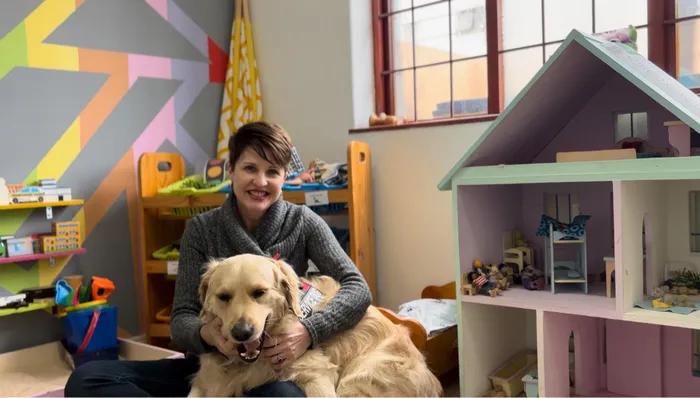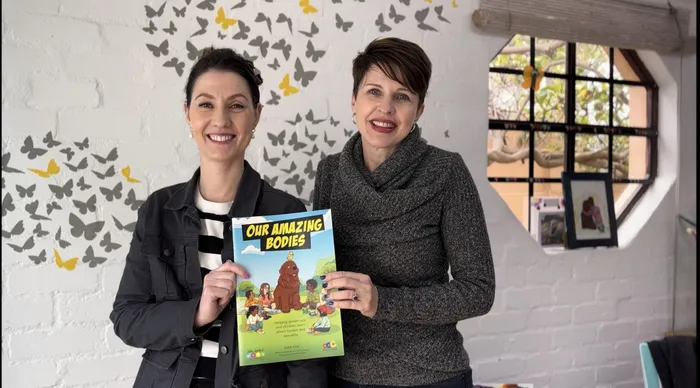Jelly Beanz offers healing and hope to traumatised children

Edith Kriel with Toffee the qualified service dog
Image: TARA ISAACS
Step into the Jelly Beanz house in Table View, and you’re entering more than just a building - you’re stepping into a safe space that offers critical psychosocial support to children and families affected by trauma.
From therapy rooms designed to help young people express what they can’t always say in words, to court preparation for children who must testify against their abusers, Jelly Beanz has been a lifeline for families since 2009.
Even Toffee, their qualified service dog with her own Instagram page, is part of the welcome. Her calming presence - in person and online - reflects the organisation’s unique approach to healing, which combines professional psychosocial support with child-friendly, trauma-informed care.
The non-profit was co-founded by Edith Kriel, a social worker, and Marita Rademeyer, a clinical psychologist from Pretoria, with a vision to create a world where every child feels safe.
Ms Kriel, who has worked in the field for three decades, explains that Jelly Beanz is a safe space for children who have experienced abuse, neglect, violence, or other forms of trauma.
“This space allows children to say, ‘This happened to me, but it doesn’t define who I am,’” she said.
“The goal is to help children leave their trauma where it belongs - so they can continue life without it affecting every waking moment or haunting their dreams.”
Beyond counselling services, Jelly Beanz supports parents and caregivers too.
“We help them deal with their own trauma so they can better support their children. We also offer training for professionals in the child protection and justice sectors, such as police officers and prosecutors,” said Ms Kriel.
The organisation has developed several educational resources, including guidebooks on child protection and online safety. One of their recent publications addresses a growing national concern: the sexual exploitation of children in South Africa.
“Children are being exposed to sexual content everywhere. They don’t understand what they’re seeing or feeling, and sadly, some end up harming others,” she said.
“Since the Covid-19 pandemic, we’ve seen an alarming increase in sexualised behaviour among children,” said Ms Kriel.
She said that Jelly Beanz also advocates at a legislative level to influence child protection policy and conducts research to inform their work.
“We are the story keepers. We carry the voices of the children, and we have a responsibility to document their realities,” she said.
She added that abuse often goes unreported - especially when it comes to boys.
“Many of the children we see have experienced sexual abuse. Parents should look out for sudden personality changes - such as an outgoing child becoming withdrawn, or a quiet child turning aggressive or bullying others,” said Ms Kriel.
However, she said that abuse is often hidden.
“Children are often taught not to speak up.”
“The dream is that no child would need to call a helpline—because they would be safe wherever they are,” said Kriel. “Until that happens, Jelly Beanz isn’t going anywhere.”
She acknowledged that achieving this dream requires a systemic shift - from political will and community responsibility to online safety and societal awareness.
“Our communities need to stand up and say, ‘Enough.’ Children shouldn’t be left to fend for themselves,” she said.
Ms Kriel spoke about children in under-resourced areas like Dunoon, Parklands, and Joe Slovo who often face multiple layers of hardship - poverty, substance abuse, and violence.
“We live in a society with huge disparities. Abuse doesn’t discriminate - it happens across economic classes. But poorer communities often lack access to the support they need,” she said.
Alarmingly, Table View has been identified as a hotspot for child trafficking, according to their research.
“People think it can’t happen in their area. But it is happening—and that’s the reality,” said Ms Kriel.
While one person can make a difference in a child’s life, Ms Kriel said she is concerned about the broader environment.
“I’m disheartened by the lack of kindness and safety our communities offer children. They’re being left to survive on their own - and that’s simply not fair.”
“One of the best parts of our work is learning from the children. We use what they teach us to train others.”
Anyone can refer a child to Jelly Beanz, as long as some form of trauma is involved.
Most of their current cases come via schools and social workers, she said.
One of the non-profit’s biggest challenges is funding, she said.
“Our staff are the instruments of change. If we can’t pay our therapists a decent salary, we can’t do the work. We must invest in people power,” she said.
“Our therapists hear stories of abuse every day. Their mental health matters, too.”
Jelly Beanz will soon launch a new training resource- Trauma-Informed Care - which offers both in-person and online modules.
“It’s about understanding how trauma affects the brain and how we can show up for children in the safest, gentlest way possible.Children are human. They’re complex. They have rights. And it’s our job as adults to protect them, nurture them, and never hurt them,” she said.
Jelly Beanz recently released Our Amazing Bodies, a new book that empowers parents and caregivers to talk to young children about bodies, boundaries, and sexuality.
Co-author Tanya Peenz said the book is a follow-up to their earlier title, Our Bodies, and reflects updated insights into brain and child development.
“We wanted to give caregivers a practical tool to start these important conversations early. Adults often find it difficult to talk about sexuality because it’s still such a taboo subject,” she said.
Our Amazing Bodies is written for children aged five to ten, but Ms Peenz said that there’s no perfect age to start or stop these conversations.
“Compared to our earlier book, this one takes children on a story-based adventure. It doesn’t have to be formal or awkward - it can become part of everyday conversations.”
She said that teachers, social workers, and professionals working with children should all have access to the book, as it equips them with language and tools to offer guidance.
“The hardest part of creating this book was addressing the wide range of cultural beliefs and values around this topic,” she said.
Her favourite feature? “The characters - and that we got to include Toffee,” she said.
To donate or get a copy of the book, email info@jellybeanz.org.za or call 021 556 2456.
Follow them on Facebook or on Instagram @jelly_beanz_sa.
You can also follow Toffe on Instagram @toffee.the.fur.therapist

Project coordinator, Tanya Peenz and Executive Director, Edith Kriel are the authors of the 'Our Amazing Bodies' book
Image: TARA ISAACS